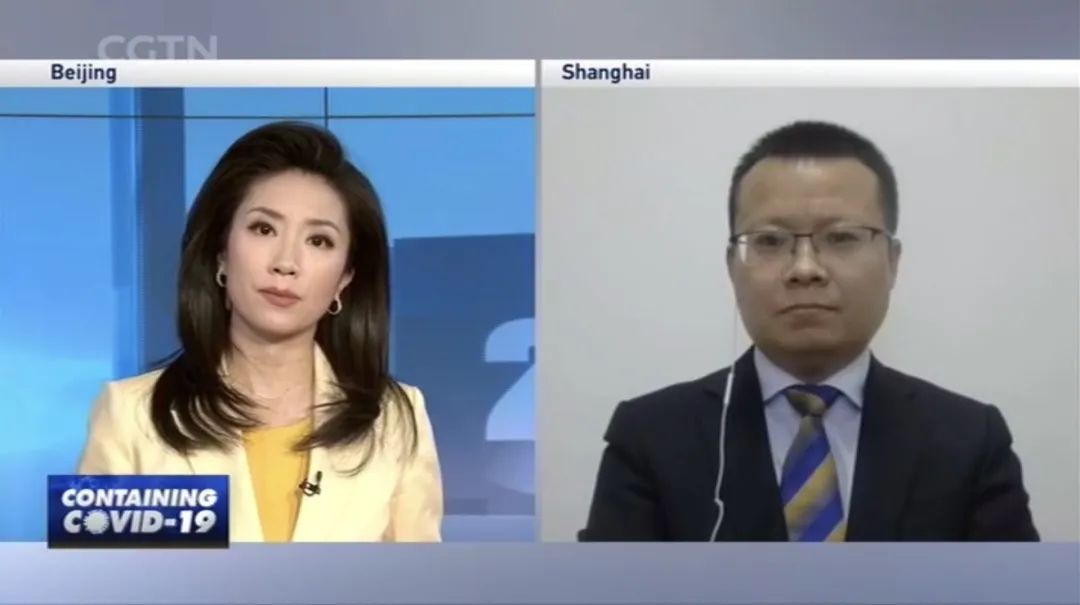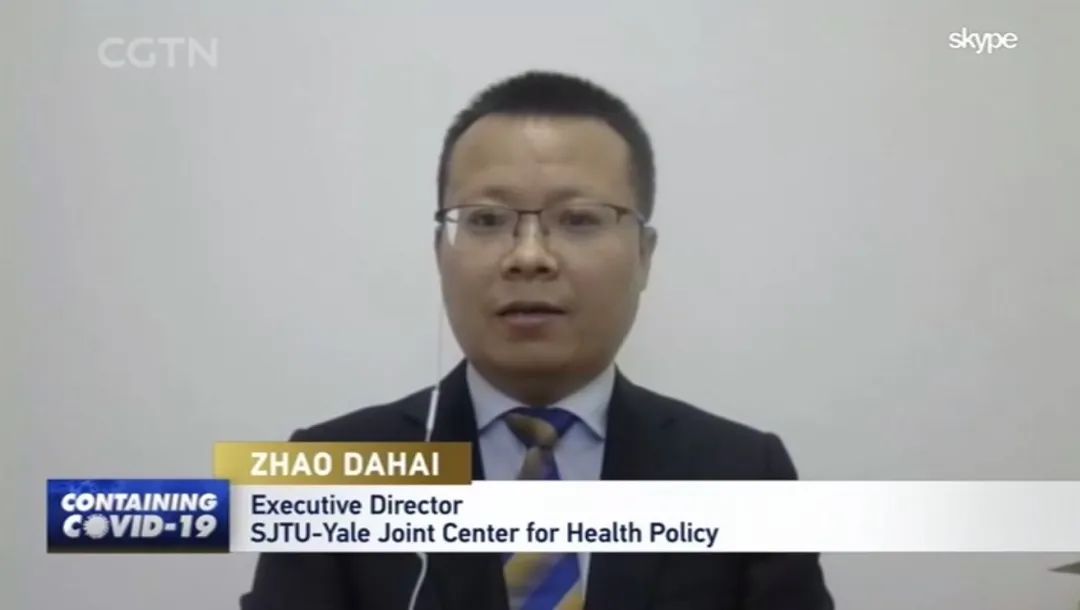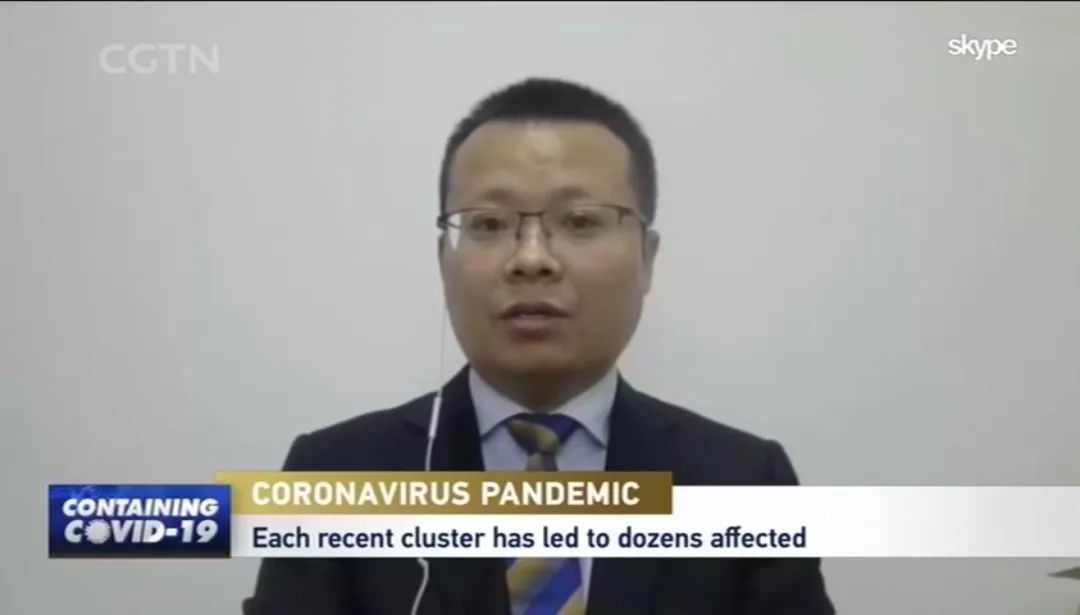上海交大赵大海关于新冠疫情第15次在电视台访谈评论:谨防疫情反弹,应进一步提升入境管制
上海交通大学国际与公共事务学院博士生导师、上海交通大学-耶鲁大学卫生政策联合研究中心执行主任赵大海,自新冠肺炎疫情以来第15次在中央电视台进行直播评论,也是第22次在央视/上视进行直播评论。在2020年4月21日晚8点的中央电视台英语频道CGTN《中国24小时》节目,赵大海就国内部分地区聚集性传染的重新出现以及新冠肺炎疫情反弹的防控等进行了评论。现将主要内容翻译并摘录如下。

主持人:我们看到,在最近的新冠肺炎疫情反弹中,北京和黑龙江省都出现了类似聚集性传染的情况。这些现象告诉我们了什么?
赵大海:首先,聚集性传染在我国大部分地区二月份的新冠肺炎暴发当中经常被报告;与此同时,聚集性传染在任何国家都是新冠肺炎传播的常见现象。最近北京和黑龙江省的聚集性传染报告发出了一个明显的信号,那就是现在还不是所有中国人和地方政府可以对新冠肺炎疫情放松的时机。其次,由于五天假期的劳动节即将到来,人们尽量不要去参加聚会。此外,人们也尽量不要在节假日期间外出旅游参观。考虑到清明节假期的期间,一些户外景点人满为患,人们应该从过去的聚集性传染当中吸取教训。此外,地方政府最好不要采取措施鼓励人们聚会和外出旅游。第三,考虑到复学将在劳动节后就临近开始,各地方政府应采取充分的防控措施,保证学校不发生聚集性传染。

主持人:北京市政府表示仍存在许多不确定因素。例如,其中一个入境的输入病例在为期两周的隔离期间没有出现核酸阳性结果或相关症状。您对疫情反弹的预防和控制有什么建议?
赵大海:首先,考虑目前全国各医院收治的新冠肺炎患者大约是一千六百名,各地方政府已具备了对新冠肺炎防控水准提升的可能性。具体而言,相关政策决策者可考虑提高所有入境人员的预防和控制标准。由于核酸检测不是很准确,曾在武汉市作为辅助确诊标准的诸如CT检查等临床诊断标准可考虑为新的补充标准。据我所知,从上周开始,辽宁省所有入境人员都要接受两次核酸检测和一次血清抗体检测。其次,考虑到新冠肺炎的暴发近期在国外依然未有明显的下降趋势,相关政策决策者可考虑采取更严格的入境措施,减少每天的入境人数。此外,劳动节过后,中国大部分地区的学生返校已是不可避免的。事实上,在复学的前提下,预防新冠肺炎的反弹对各地都是巨大的挑战。因此,对入境人员采取更严格的措施,譬如减少每日入境人数或关闭相当数量的入境口岸是非常有意义和必要的。
供稿者:国务学院
日期:2020年4月22日
' 15th comments on TV during the Pandemic: Staying Alert, Placing Travel Restrictions against Rebounds
Dahai Zhao, a doctoral supervisor at School of International and Public Affairs of Shanghai Jiao Tong University and Executive Director of Shanghai Jiao Tong University-Yale University Joint Research Center for Health Policy, has been interviewed by CGTV for the 15th time (the 22th time by CGTV / DFTV) since the COVID-19 pandemic. At 20:00 on April 22, 2020, Zhao commented on travel restrictions on “China 24”.
Anchor: We're seeing what looks like cluster infections in the recent coronavirus bump, including in Beijing and Heilongjiang province. What does that tell us?
Zhao: First, cluster infections were frequently reported in the outbreak of COVID-19 in February in most areas of China, and are common phenomena for the transmission of COVID-19 in any country. The recent report of cluster infections in Beijing and Heilongjiang Province, sends an obvious signal that it is not the time for all Chinese people and any local government to relax the vigilance on combating COVID-19. Second, due to the fact that the 5-day national holiday of Labor Day is coming, people try not to attend gatherings. Further, people try not to visit the scenic spots during the holiday. Considering the 3-day national holiday of Qingming Festival, there were very crowed in some outdoor spots, people should draw the lessons from the past cluster infections. In addition, local governments had better not take measures to encourage people’s gatherings and traveling. Third, considering returning schools will be approaching after the Labor Day, local governments should take full pre-cautious measures to guarantee no cluster infections in schools.
Anchor: Beijing authorities say there are still many uncertainties. For example, one of the imported cases didn't show positive results or symptoms during his two-week quarantine. What's your advice on preventing and controlling rebounds?
Zhao: First, considering there are about 16 hundred confirmed cases of COVID-19 are in hospitals in the whole China, local governments have the remaining capacity to increase the prevention and control level of COVID-19. Specifically, policymakers may consider increasing the prevention and control standards for all potential imported people. Due to the fact that nucleic acid detection is not very accurate, some other complementary testing measures such as clinical diagnosis including CT scans which was used in Wuhan, may be reconsidered. As far as I know, in Liaoning Province, since the last week, all imported citizens should be tested for nucleic acid twice and one-time serum antibody test. Second, Considering the outbreak of COVID-19 abroad has no obvious trend of decreasing in the near future, policymakers may consider taking more strict measures to decrease the daily total number of imported people. Further, returning schools are inevitable in most areas in China after the Labor Day. Actually, to prevent and control rebounds of COVID-19 in China with returning schools is a huge challenge for the related local governments. Therefore, to take more strict measures for imported people such as decreasing the daily total number or shutting down a considerable number of ports of entries to China is meaningful and necessary.
Contributor: SIPA, SJTU
Date: April 22

